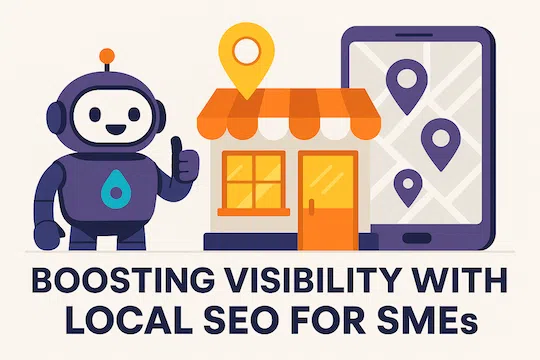Monday, July 21, 2025 |
Why Local SEO Matters for Small Businesses
In today’s digital-first world, most customers turn to search engines before stepping foot in a store, calling a provider, or booking a local service. For small and medium-sized enterprises (SMEs), Local SEO isn’t optional—it’s survival.
More than 46% of all Google searches have local intent, and phrases like “near me” or “open now” are now standard across mobile and voice queries. Without a strong local SEO strategy, your business risks being invisible to people ready to buy, right in your area.
But local SEO is more than just claiming a Google Business Profile. It’s about sending consistent, location-based signals that search engines and AI-driven discovery engines can trust.
Key On‑Site and Off‑Site Optimisations
Whether you run a dental practice, design agency, or artisan bakery, these foundational local SEO tactics can dramatically increase your visibility:
✅ On‑Site Optimisations
-
Localised keyword integration: Optimise key landing pages for “[service] in [location]” phrases.
-
NAP consistency: Ensure your Name, Address, and Phone number are correct and crawlable across your site (ideally in the footer).
-
Location-specific pages: If you serve multiple areas, build unique pages for each with tailored content.
-
Schema markup: Use Local Business schema to give search engines precise location and service info.
✅ Off‑Site Optimisations
-
Google Business Profile (GBP): Claim and fully optimise your listing with photos, services, hours, and keywords.
-
Local citations: Ensure your business info is consistent across directories (Yell, Yelp, Thomson Local, etc.).
-
Customer reviews: Encourage happy clients to leave reviews, and always respond, this signals engagement and trust.
-
Backlinks from local sources: Partner with local blogs, papers, or chambers of commerce to get valuable inbound links.
The Power of Geo‑Tagged Photos (Hidden Gem)
Most SMEs are familiar with posting photos on their Google Business Profile or website, but few optimise those images with geo-tags, missing out on a subtle but powerful boost in visibility.
What Is Geo‑Tagging?
Geo-tagging is the process of embedding location data (latitude and longitude) into the metadata of an image file. When uploaded to platforms like Google Business Profile, these tags reinforce the physical relevance of your business to local searches, especially for mobile users and “near me” queries.
Why It Works
AI and search algorithms use image metadata as part of their contextual understanding. A geo-tagged photo tells Google:
“This photo of a dish, storefront, or office was taken at this exact location.”
This adds trust and precision to your local presence.
How to Use It
-
Take photos with GPS-enabled devices (most smartphones will do this by default).
-
Verify the GPS data with tools like GeoImgr or Adobe Bridge.
-
Upload images directly to your GBP, website, or social media profiles.
-
Use image file names and alt text with localised keywords (e.g., “Hair-salon-in-Bristol.jpg”).
It’s a small tweak but it can make a noticeable difference in competitive local niches.
Measuring Success with Local Metrics
Once your local SEO strategy is live, track progress using location-specific analytics. Here’s what to look at:
-
Google Business Insights: See how many views, calls, and direction requests you’re getting.
-
Search Console Geo Reports: Track impressions and clicks from specific regions.
-
Keyword ranking tools: Use platforms like BrightLocal or SEMrush to monitor local keyword positions.
-
Conversions: Track goals like contact form submissions or phone calls that originate from location-specific pages.
Final Thoughts
Local SEO isn’t just about being found, it’s about being trusted by both customers and the algorithms that guide them. For SMEs, the opportunity lies in showing up at the exact moment someone nearby is looking for what you offer.
From the fundamentals like on-page optimisation to smart tactics like geo-tagged imagery, every element contributes to stronger local visibility. If you want to dominate your area, start with Local SEO and let your community find you first.
